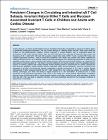| dc.contributor.author | DOHERTY, DEREK | en |
| dc.contributor.author | Dunne, Margaret | en |
| dc.date.accessioned | 2014-10-16T11:47:45Z | |
| dc.date.available | 2014-10-16T11:47:45Z | |
| dc.date.issued | 2013 | en |
| dc.date.submitted | 2013 | en |
| dc.identifier.citation | Dunne, MR, Elliott, L, Hussey, S, Mahmud, N, Kelly, J, Doherty, DG, Feighery, CF, Persistent Changes in Circulating and Intestinal gamma delta T Cell Subsets, Invariant Natural Killer T Cells and Mucosal-Associated Invariant T Cells in Children and Adults with Coeliac Disease, PLOS ONE, 8, 10, 2013, 76008 | en |
| dc.identifier.other | Y | en |
| dc.identifier.uri | http://hdl.handle.net/2262/71523 | |
| dc.description | PUBLISHED | en |
| dc.description.abstract | Coeliac disease is a chronic small intestinal immune-mediated enteropathy precipitated by exposure to dietary gluten in genetically predisposed individuals. The only current therapy is a lifelong gluten free diet. While much work has focused on the gliadin-specific adaptive immune response in coeliac disease, little is understood about the involvement of the innate immune system. Here we used multi-colour flow cytometry to determine the number and frequency of γδ T cells (Vδ1, Vδ2 and Vδ3 subsets), natural killer cells, CD56+ T cells, invariant NKT cells, and mucosal associated invariant T cells, in blood and duodenum from adults and children with coeliac disease and healthy matched controls. All circulating innate lymphocyte populations were significantly decreased in adult, but not paediatric coeliac donors, when compared with healthy controls. Within the normal small intestine, we noted that Vδ3 cells were the most abundant γδ T cell type in the adult epithelium and lamina propria, and in the paediatric lamina propria. In contrast, patients with coeliac disease showed skewing toward a predominant Vδ1 profile, observed for both adult and paediatric coeliac disease cohorts, particularly within the gut epithelium. This was concurrent with decreases in all other gut lymphocyte subsets, suggesting a specific involvement of Vδ1 cells in coeliac disease pathogenesis. Further analysis showed that γδ T cells isolated from the coeliac gut display an activated, effector memory phenotype, and retain the ability to rapidly respond to in vitro stimulation. A profound loss of CD56 expression in all lymphocyte populations was noted in the coeliac gut. These findings demonstrate a sustained aberrant innate lymphocyte profile in coeliac disease patients of all ages, persisting even after elimination of gluten from the diet. This may lead to impaired immunity, and could potentially account for the increased incidence of autoimmune co-morbidity | en |
| dc.format.extent | 76008 | en |
| dc.language.iso | en | en |
| dc.relation.ispartofseries | PLOS ONE | en |
| dc.relation.ispartofseries | 8 | en |
| dc.relation.ispartofseries | 10 | en |
| dc.rights | Y | en |
| dc.subject | Pediatrics | en |
| dc.subject | NK cells | en |
| dc.subject | Lymphocytes | en |
| dc.subject | Gluten | en |
| dc.subject | Epithelium | en |
| dc.subject | Diet | en |
| dc.subject | Blood | en |
| dc.title | Persistent Changes in Circulating and Intestinal gamma delta T Cell Subsets, Invariant Natural Killer T Cells and Mucosal-Associated Invariant T Cells in Children and Adults with Coeliac Disease | en |
| dc.type | Journal Article | en |
| dc.type.supercollection | scholarly_publications | en |
| dc.type.supercollection | refereed_publications | en |
| dc.identifier.peoplefinderurl | http://people.tcd.ie/dohertde | en |
| dc.identifier.peoplefinderurl | http://people.tcd.ie/dunnem12 | en |
| dc.identifier.rssinternalid | 96084 | en |
| dc.identifier.doi | http://dx.doi.org/10.1371/journal.pone.0076008 | en |
| dc.rights.ecaccessrights | openAccess | |
| dc.subject.TCDTheme | Immunology, Inflammation & Infection | en |
| dc.subject.TCDTheme | International Development | en |
| dc.subject.TCDTag | Biomedical sciences | en |
| dc.subject.TCDTag | COELIAC DISEASE | en |
| dc.subject.TCDTag | HUMAN T-CELLS | en |
| dc.subject.TCDTag | Mucosal-associated invariant T cells | en |
| dc.subject.TCDTag | TCR GAMMA DELTA(+) T CELLS | en |
| dc.identifier.rssuri | http://www.ncbi.nlm.nih.gov/pubmed/24124528 | en |
| dc.contributor.sponsor | Other | en |




